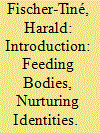| Srl | Item |
| 1 |
ID:
164884


|
|
|
|
|
| Summary/Abstract |
Focusing particularly on the Madras College of Physical Education opened in 1919, this article reconstructs the role of the United States of America-dominated Indian Young Men's Christian Association (YMCA) in the spread of physical-education schemes in South Asia between the beginning of the century and the outbreak of the Second World War. American YMCA secretaries stressed the scientific, liberal, and egalitarian character of their ‘physical programme’ aiming at the training of responsible and self-controlled citizens and therefore supposedly offering an alternative to British imperial sports. The study demonstrates that the Y indeed exercised a considerable influence by acting as adviser to provincial and ‘princely’ governments as well as through the graduates of the Madras College of Physical Education (MCPE), many of whom became physical directors in educational institutions in India, Burma, Ceylon and other Asian countries. At the same time, it also makes clear that North American models could not be transplanted in a simple or straightforward manner to South Asian contexts. For one, in spite of its representation as a ‘school for democracy’, the Y's supposedly inclusive and emancipatory discourses and practices of physical fitness remained over-determined by the powerful influences of the colonial discourse of race, and the programme of the Indian Y continued to be rife with the imperial tropes of somatic Orientalism predicated on the idea of fundamental difference between Westerners and South Asians. Likewise, the Y's sports mission turned out to be less American than its advocates had hoped: ‘sportified’ versions of local games and physical exercises played an ever-increasing role in the numerous institutions of the Y in South Asia, leading eventually to a thorough ‘pidginization’ of its fitness regime.
|
|
|
|
|
|
|
|
|
|
|
|
|
|
|
|
| 2 |
ID:
178159


|
|
|
|
|
| Summary/Abstract |
This introductory essay provides an overview of the main subfields of research into the histories of foodstuffs, diet and nutrition in nineteenth- and twentieth-century South Asia, thus situating the contributions to this themed special section in wider historiographical debates and controversies. It argues that the bulk of existing research has focused either on the conflictual role of food and diet in the colonial encounter, or on the emergence of nutritional sciences in India (and in the countries providing food aid to India) during the post-colonial phase in response to the protracted recurrence of food scarcity in the subcontinent. It subsequently identifies a research lacuna by pointing to the conspicuous absence of historical studies on Dalits and food in spite of the topic’s obvious relevance for the creation and maintenance of social hierarchies. The article ends with short previews of the individual essays assembled in this collection.
|
|
|
|
|
|
|
|
|
|
|
|
|
|
|
|